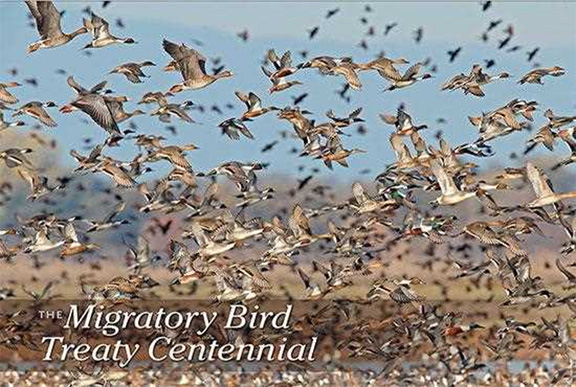8 August 2018
This July 2018, we celebrate the 100th anniversary of one of the first environmental laws of the United States, the Migratory Bird Treaty Act (MBTA) of 1918. Exactly 100 years ago, Congress enacted this legislation, implementing the convention for the protection of migratory birds between the United States and Great Britain (acting on behalf of Canada). The statute makes it unlawful without a waiver to pursue, hunt, take, capture, kill or sell birds listed therein as Migratory birds. This act has served as a safety net for migratory birds of North America while allowing necessary development activities.
All other subsequent laws impacting our birds fundamentally rest on the foundation of the MBTA. They start with the Migratory Bird Conservation Act of 1929 and the Migratory Bird Hunting Stamp Act of 1934, through the Endangered Species Act of 1973 and beyond. These Acts have been thoughtfully amended by Congress, but never undermined. So, when you seriously tamper with the foundational MBTA, you are potentially destabilizing a lot!

The balance between protection and development in the MBTA has now been upset by a December 2017 Department of the Interior Solicitor’s opinion. With this recent opinion, decades of cooperation that benefit our migratory birds and our societal needs has been seriously upset. With this opinion, any lawful activity that impacts migratory birds or their habitat is considered incidental and does not require actions to avoid, minimize, or mitigate for impacts to migratory birds. This is a major challenge to the underpinning of bird conservation laws in the U.S.
This recent Solicitor’s opinion essentially eliminates the protections provided by the Migratory Bird Treaty Act of 1918 and hastens the decline of numerous migratory birds throughout North and South America, many of which are being considered for listing as Threatened or Endangered species under the Endangered Species Act of 1973.
Does this make any sense? What can be done to change this recent interpretation of a law that has been in place for 100 years, enforcing international treaties that protect migratory birds?
In the last two months, a number of conservation and environmental organizations have filed litigation challenging this fundamental change. Support for this litigation along with letters written to Members of Congress would be the most logical path designed to return to a more appropriate balance between protection and the many needs of society. Such action should raise awareness of the serious stakes involved.